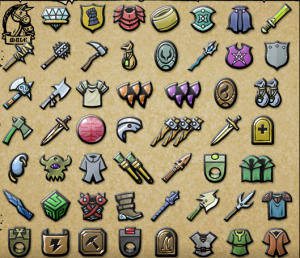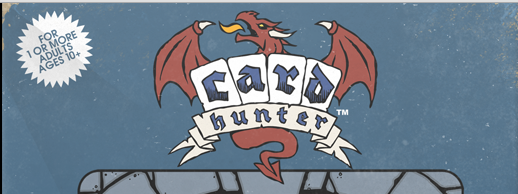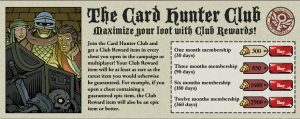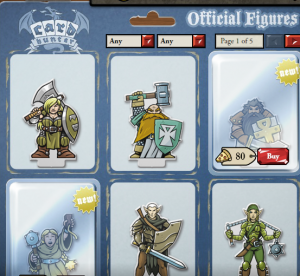Last week Card Hunter: The free-to-play combination of tactical RPG and collectible card game design went live from Blue Manchu. And after spending the weekend rebuilding my team and decks I wanted to expand on my thoughts from my spotlight.
Decked out:
I’ve already went into detail about a lot of the gameplay design of Card Hunter in my spotlight, so this piece will more or less cover my impressions of the game now that it is live. And if you haven’t listened to it already, we sat down with Joe Mcdonagh from Blue Manchu a few weeks ago to talk about Card Hunter further.
The gameplay of equipping your characters with loot, like in an ARPG and in return creating their own personalized deck is very compelling. While the loot itself in Card Hunter is not randomized, there is no limit on where you can find loot, providing a great incentive to play. There is a lot of variety of cards both between the individual classes and within them.
A warrior might want to specialize with clubs for stronger attacks, or use spears for slightly weaker, but further ranged strikes. While spell casters can go for projectiles, area affecting and other types of spells.
The enemy variety is really well done and works hand in hand with the CCG theme. Enemy types come with decks tailored made for them and in return, makes every new encounter a different challenge.
One time you may fight a giant golem who moves slow but has powerful close range attacks. Next, you may deal with wizards who float around and create harmful tiles to block your assault. As with a CCG, there is no unbeatable combo or perfect deck that works in every situation.
Moving on, another area that I really like about Card Hunter is the monetization model. As we talked about, Card Hunter uses gold coins as regular currency and pizza slices as premium. Blue Manchu has done an exemplary job of balancing out the game between the two currencies.
You can play Card Hunter and see almost all the content without spending one dollar. Premium currency can be used for new costumes, quests and the membership club. The membership club basically gives you an additional loot drop after every battle while you are signed up.
On the cast, we talked about how a goal of a F2P game should be to make people want to spend money and I think Card Hunter has definitely succeeded on that front.
Now with that said, I do have some minor complaints to talk about with the game.
Folded Cards:
As I mentioned in my spotlight a few weeks ago, part of the problem of Card Hunter’s appeal is the fact that it exists between a tactical minded game of set rules and decision making and the randomness of a CCG.
The first issue has to do with the debated topic of the game’s difficulty. Part of it is that you’ll quickly find that enemies have access to stronger attack and defense cards comparative to what you find at your level. Now this was meant to offset your tactical advantage of being smarter than the AI.
The other part of the difficulty has to with the encounters. Earlier I mentioned that every enemy type was designed around specific deck building. What that means is that the difficulty of an encounter is relative to what your party’s decks include.
For example, let’s pretend that you have a melee focused party with high damage cards. When fighting normal enemies or slow moving spell casters the game is easy to the point of boring, but then let’s say you run into a group of enemies who wear a lot of armor.
Such as Trogs (I think that was the spelling) that can wear and keep armor to the point of resisting 8 points of damage with the right rolls. Now, your physical heavy party is useless and will not be able to scratch them.
The reason has to do with Card Hunter’s CCG design. As a CCG, the cards are all about hard rules which in turn are meant to be broken by other cards. With that last example, a party could have penetrating attacks to get through armor, or specific cards that remove armor to render them helpless.
As we talked about on the cast with Joe, Card Hunter was meant to follow the CCG tradition of rebuilding your deck or in this case, changing your party’s equipment.

There is a huge variety of items currently in the game, but it’s really hard to know when you’re losing due to bad luck, or poor equipment
But playing the game, I found that the UI and overall design somewhat clashes with that. There is no easy way to sort for specific card types that you may need, like armor removal, healing and so on.
Because stores only restock daily, if you don’t have any of the specific cards needed, your only options are to push through and get lucky, get lucky on other quests or wait until the stores restock.
Another problem is to know exactly when you should start looking for new cards. Due to the shuffled deck systems, a match could sometimes go either way simply by what cards you drew. And the player won’t have any idea if they are losing because their gear isn’t good enough or correct, or if the luck of the draw was against them.
I found playing up to level 10 that the power curve of your equipment and cards advance slower compared to the enemies, with exception to power token equipment, which you are limited by your level to wear.
The other problem which isn’t as immediate has to do with the game’s longevity. Anyone can tell you that a successful F2P game is all about continued support and the second that a F2P game says that it’s done developing new content (IE Age of Empires Online) then it is finished.
With Card Hunter, there are currently only two types of scenarios for battles and even with the variety of enemy decks, the game is somewhat repetitive if you play a lot in one sitting.
But what’s going to be hard for Blue Manchu is expanding the game with new equipment.
This isn’t an ARPG where the game has loot tables designed to keep creating progressively stronger loot, or a game where a designer could quickly add some assets and create something new.
Every new item that can appear in Card Hunter will need to have cards associated with it and for every new card; they will need to be weighed with the cards that are currently in the game for balance reasons.
In order for the CCG aspect of the game to work, new cards can’t be just power increases: For example: a mighty spear that does 9 points of damage and the new card would be the super mighty spear that does 10.
As we talked about on the cast, the whole team at Blue Manchu does have ideas for what to expand on with Card Hunter and I hope that they will have the chance.
Despite my issues, Card Hunter is an amazing game nonetheless and is one of the best uses of F2P design I’ve seen since League of Legends. It is easily one of the top games I’ve played this year and things can only go up for it and Blue Manchu.




